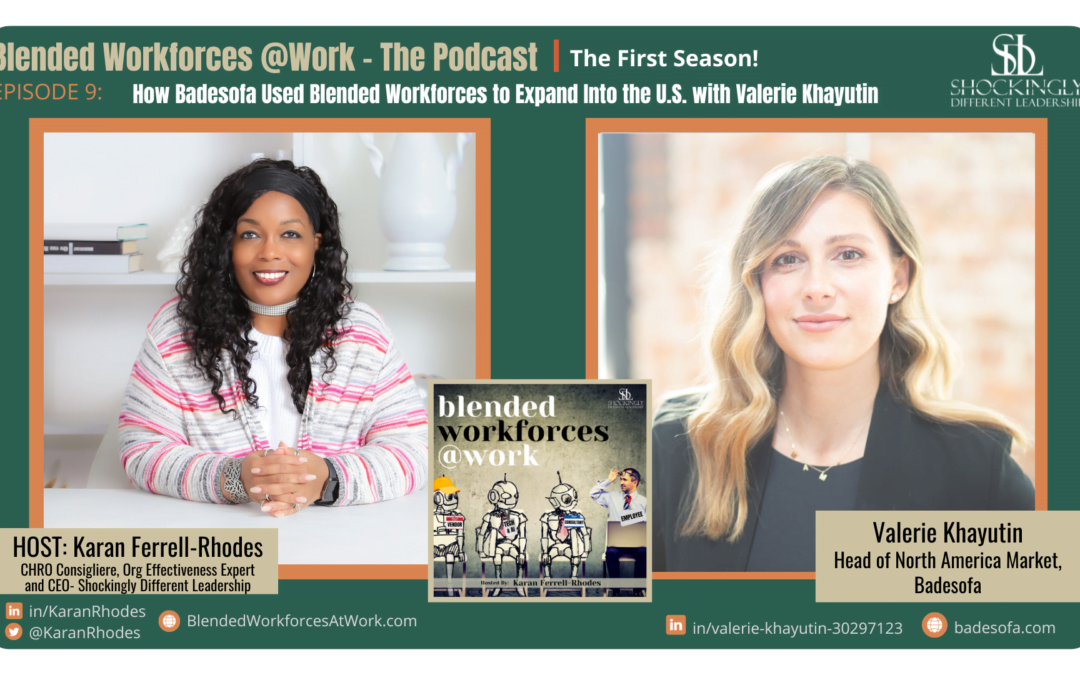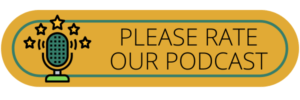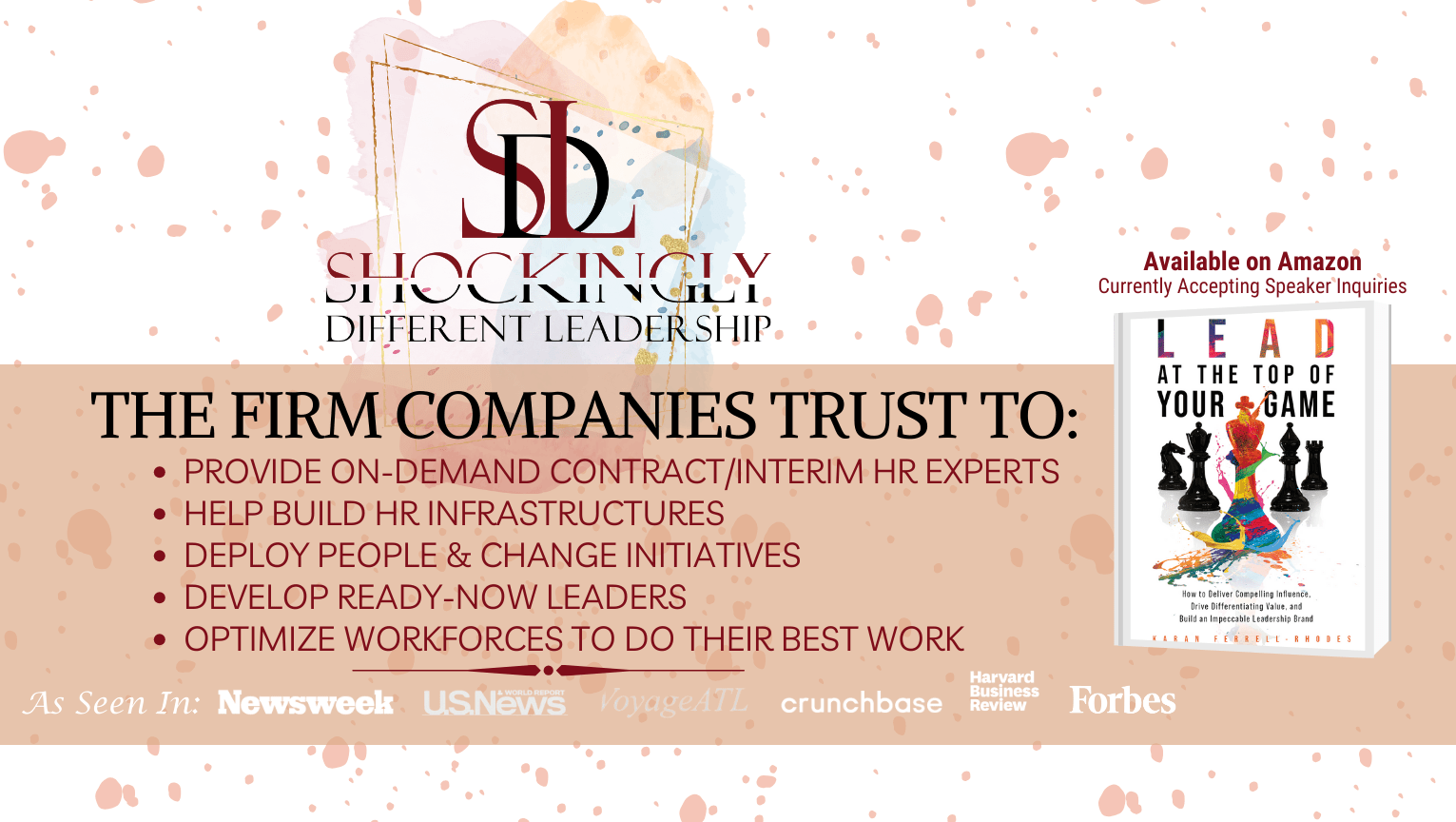IN THIS EPISODE, KARAN FERRELL-RHODES INTERVIEWS VALERIE KHAYUTIN.
In this episode, Valerie Khayutin discusses her strategies for managing internal and external talent, stressing the need for clear communication, collaboration, and respect for consultant boundaries. She also highlights the critical role of execution and effective onboarding in achieving business success.
Valerie Khayutin is the General Manager and CEO of North America at Badesofa, and she shares her insights on navigating the competitive consumer business landscape. She emphasizes the importance of prioritization and results-driven leadership, especially within blended workforces.
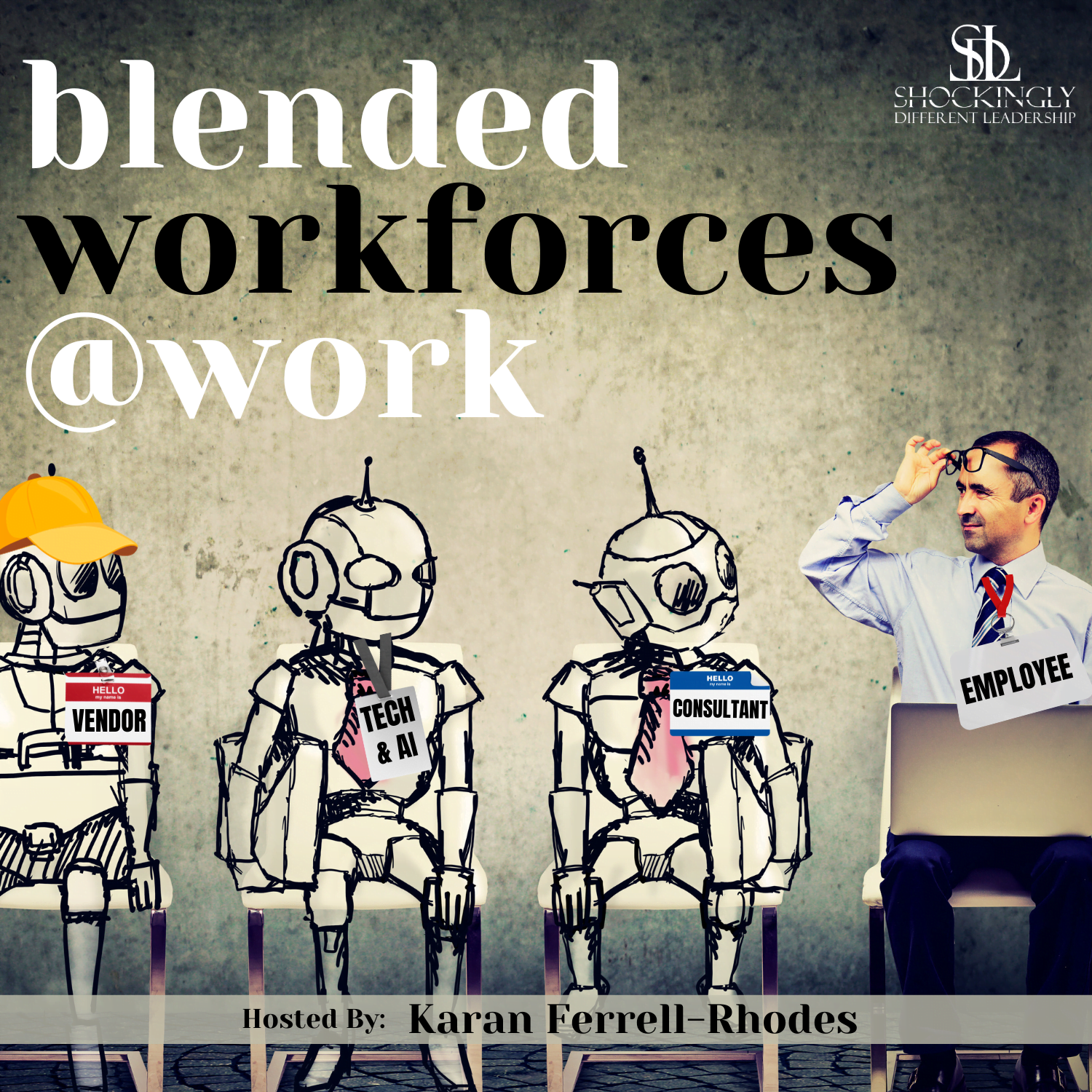
Posted by
SDL Media Team
Rather view our video podcast?

WHAT TO LISTEN FOR:
- How can a workforce be structured to ensure efficiency and productivity?
- How can a leader demonstrate a drive for results in a blended workforce?
- What are common challenges in leading a blended workforce?
- What tactics are employed to motivate a blended workforce to achieve results?
- What strategies are successful for finding and hiring external talent?
“At least once a week, have a shared [blended workforce] meeting for the entire team.”
FEATURED TIMESTAMPS:
[03:38] From Russia to California
[05:33] Valerie’s Profesional Background
[07:52] The Power of a Blended, Global Team
[09:17] Leadership Strategies for Seamless Team Operations
[12:29] Building a Dream Team: The Art of Recruitment and Referrals
[16:23] Collaboration in a Blended Workforce
[21:31] Streamlining Onboarding
[24:19] Signature Segment: Valerie’s LATTOYG Tactics of Choice: Leading With the Drive for Result: The Key to Success in Competitive Markets
[25:43] Signature Segment: Valerie’s entry into the LATTOYG Playbook: Mastering Prioritization

ABOUT VALERIE KHAYUTIN:
Valerie Khayutin has a proven track record of launching and operating early-stage consumer brands in the health and wellness market. She has developed, brought to market, and assembled teams for several businesses. With over 10 years of experience, Valerie brings deep expertise in the health and wellness market and is passionate about building strong, future-proofed companies.
Her track record includes Danone, Freshly, Root Logic, Five Four Ventures, and more, where she led business growth and development along with strategies to improve profitability. As Badesofa’s Head of the North American market, Valerie is utilizing her experience and skills to bring this multi-million dollar German business into the North American wellness market.
LINKS FOR VALERIE:
Website: badesofa.com/
LinkedIn: inkedin.com/in/valerie-khayutin
ADDITIONAL RESOURCES FOR YOU:


Episode Sponsor
SDL is the go-to firm companies trust when needing to:
- supplement their in-house HR teams with contract or interim HR experts
- implement leadership development programs that demonstrate an immediate ROI and impact on the business

Episode 9 | How Badesofa Used Blended Workforces to Expand Into the U.S. with Valerie Khayutin
Valerie Khayutin
The way I view it personally, is that I think that whether it’s an internal team member or part time, full time consulting agencies doesn’t matter. You have to treat them as one cohesive unit as one team. And from my experience, being on a consulting side, kind of on the other side of the spectrum than big companies, small companies, I see that this approach truly works best.
Karan Rhodes
Blended workforces are one of the hottest talent strategies today, where employers are using a mix of traditional employees with external resources like independent contractors, coaches, consultants, vendors, and technology solutions, all in order to enhance competitiveness, ensure cost flexibility, and expedite business goals. But how are the successful companies infusing blended workforces into their business strategy? And what are the critical success factors and pitfalls to avoid during implementation? And on the flip side, what does it really take for suppliers to improve their chances of finding and landing contract opportunities? The devil is in the details, my friends! I’m your host, Karan Ferrell Rhodes, and it’s time to get smarter about Blended Workforces at Work! Hello, my dear superstars Welcome to another episode of the blended workforces at work podcast. This is Karan and I’m super thrilled to welcome you to today’s show. Now on today’s show, we are just tickled pink to feature absolutely fantastic guests by the name of Valerie Khayutin… probably murdered it, Khayutin. She’s going to correct me in a minute because I want her to get her name correctly. But she is the head of the North American market for Badesofa, which is a German based company that provides luxury home spas through a wonderful line of bathing products catered to wellness and well being. So if you want a luxury spa mouthfeel within your home, you got to check them out. And they have expanded from Europe to the US and are really making a big presence here as they expand. So definitely check out the show notes and go to their website and see their offerings I didn’t know about them before we recruited Valerie to come on the podcast. And now I told her I’m in love. She’s on my shopping list. I’ve added the company on the shopping list to check things out. Well, Valerie has a proven track record and helping to advise on operating early stage companies in the consumer brand in the health and wellness market, including companies such as the known freshly and route logic. And I was super excited to have her on the show today because she actually runs a blended workforce team herself. So she lives and breathes it every single day. And I just learned that she also started as a consultant. So she was on the other side of the table as well. So I can’t wait to hear how she does it today. What was her experience when she was a consultant? And any advice that she may have? So welcome to the show. Valerie.
Valerie Khayutin
Happy to be here.
Karan Rhodes
Awesome. Okay, you got to pronounce for the audience your name? No, I’ve heard of it. But please do.
Valerie Khayutin
It’s Valerie Khayutin.
Karan Rhodes
Khayutin.
Valerie Khayutin
It’s a very tricky one…
Karan Rhodes
It is. You’ve been so gracious. I tried. So I hope I get a forever it at least. All right, Valerie. Well, we have a lot to talk about today. But before we get started, we love to for you to share your for, you know, just as much as you feel comfortable if you can give us a sneak peek into your life outside of work.
Valerie Khayutin
Yeah, sorry. I’m originally from Russia, which is where the last name coming from and the accent because I know a lot of people are wondering, and I get asked that a lot. But I actually lived in New York for 17 years. So it’s been a while. And recently in the past couple of months, we made the move to California. And all of my free time when I’m not working is just spent adjusting to the new lifestyle. I bet it’s such a change cultural energetically kind of what you do outside of work. It’s very, very different. So I’m adjusting, doing my best to love it and get used to it. And the good news is that I have a little toddler who really loves it here. So I think that’s an encouraging sign.
Karan Rhodes
It definitely is. Now how did you adjust to a very short winter if a winter at all.
Valerie Khayutin
I didn’t miss the snow. I missed the cold. I mean, I’m from Russia. And then I lived in New York for such a long time, that it’s just such a part of my life like bundling up and the warm cold and hard cup of coffee and had. So I think that’s been actually really tough for me not having a winter. But I’m sure that you asked me the same question in two years, and I will be like what winter? It’s amazing.
Karan Rhodes
Probably sso. We have some very close friends who are Russian and there’s actually a nice sized community here in Atlanta. And that’s what Vadim and his family always say. They said they love The changing of the weather is here. But they do miss the call of Russia. That’s what they grew up in. So I, yeah. Well, awesome. Well, thank you so much for sharing that. Well, let’s start by if you don’t mind sharing a little bit about how you started your career before your position now, just to give our listeners a little idea of your background, from a professional perspective,
Valerie Khayutin
Yeah, like you mentioned, I actually started my career as a consultant. So I worked for a pretty large management consulting firm in Russia. And then that’s what brought me to New York in the first place. I came for a project. And I continued that work for a couple of years and never left. So I ended up going to business school in the US. And after my MBA, that’s when I made the transition to the in house general management. And then for seven, yeah, nearly seven years, I was managing large global brands. So very corporate, very structured, CPG approach. And then I did pretty much the same thing like managing, launching building businesses, but for startup. And that’s been an interesting journey. I launched and brought brought to market and build growth startups that went through the acquisition, some that I continue to grow, and some that are in very early stages, like bought a sofa in in the North America right now. And I think what’s interesting is that one thing that they all have in common, no matter the size of the business, whether it’s global, low low call, or what type of the businesses that the team, and how you build a team and how you structure the team, is really the key to the success.
Karan Rhodes
I love you said that because you’re so right, I’ve had, you know, more years than I can imagine 20 plus years in corporate. But in the consultants side of advice similar to you, companies of different sizes, and the composition of the teams, and their skill sets, their diversity of perspectives is so important to the success of the company, and also to visit individual workers as well for their fulfillment. And so, you know, that’s one of the reasons why we had the podcast is in better understanding workforce structures. And you know, how companies get things done, and sometimes they’re successful, and sometimes they have to make tweaks to their workforce. So I’m just curious, can you tell us a little bit more about your team at Badesofa?
Valerie Khayutin
Yeah, and my team is truly the representation of this blended workforce. I have a fairly small team. I’m, I’m a big believer in Lln of internal team, which is only two people now. And the rest is part time, freelancers, consultants, agencies, and my team is completely dispersed globally. So which allows me this flexibility, right, like I easily move from New York to California without really losing any productivity, because my team is some of it based in Germany, a couple of people based in Germany, in pain in Canada, New York, California. So everywhere, truly, and we kind of managing it very seamlessly because of the processes that we have established.
Karan Rhodes
That sounds amazing. I had to volunteer to be part of your team. That sounds like a fantastic mix. Ah, but let’s pull back the layers of the onion a little bit. And can you share a bit more on what you do as a leader to try to help your team’s operations to be more seamless? Are there tools that you use? And how do you keep their energized and focus on the company culture?
Valerie Khayutin
The way I view it personally, is that I think that whether it’s an internal team member or part time, full time consulting agencies doesn’t matter. You have to treat them as one cohesive unit as one team. And from my experience, being on a consulting side, kind of on the other side of the spectrum than big companies, small companies, I see that this approach truly works best. And to me that encompasses two kind of crucial things. One is sharing goals together. So the strategy strategic objectives and the results that we’re trying to accomplish, it’s shared amongst everybody on the team. And not kind of everybody just having totally separated individual KPIs without seeing or understanding how that ties to the entire picture and how that ties to other consultants or freelancers. KPIs, I think it’s absolutely important. So every quarter, and every month, we go over strategic plans, I share how we’re performing, I share what overall company goals are, what the priorities are, even if that doesn’t necessarily touch the respective discipline, I think it’s absolutely important for them to know. And a lot of times when we have in the conversations, things that outside of kind of day specific scope would come up. And I think that just enriches the entire team experience and makes everyone so much better. Like for example, operational consultants would say, Hey, I actually know I know that you mentioned that you need to improve customer service. I actually know somebody, this company that does customer service for another one of our clients, and they phenomenal, do you want an introduction like this conversation come up, or in Mother’s Day promotion, for example, we just running one of the consultants brought up a really, really crucial point, about sensitivity about Mother’s around Mother’s Day, and that we need to give people an opportunity to unsubscribe from emails, for example, things like that. That’s not necessarily her area of expertise or her discipline, but she has previewed to what other companies are doing, and a broader scope. And, you know, I think that those insights are so valuable, that you just you just cannot ignore it.
Karan Rhodes
No, absolutely. That’s kind of the team helping the team, if you will, and they’re all all in to make sure that you’re all you all are operating the best and have access to this, what procedures and talents and everything that they observe, you know, even from other companies taking that I call it in institutional knowledge sharing that, you know, to help make everybody better. Now, I’m curious, did you for the people that are not traditional employees on your team? Were they people you knew, or referrals or former, or contractors that you put out an RFP and interviewed for? How did you find some of those people that ended up being part of your team?
Valerie Khayutin
Well, the short answer is all of the above. Most of the most of my current team members came either through team members that I worked with in the past, or so I just worked with this consultant before agency before and I brought them on board, which I think is a very common approach. Or another true gem is really through the referral of the same of those team members that are already part of my unit. And I found that this is really crucial. So for example, my PR consultant, I found her I found her through the referral of another agency that I work with, and they truly they want the best for the team. They know what we’re trying to accomplish, how we operate as a company, and they really able to recommend the right person. And I find that that’s a that’s a really important, very crucial aspect.
Karan Rhodes
Oh, amazing. And one of the things we do try to do via the podcast is to help, you know, vendors, suppliers, and external talent, like consultants and contractors don’t have you know, that they have to work very hard to be even considered on the shortlist for, you know, potential contracts. And they too have to be skilled at networking and then do a great job so that they are referred, because you’re right, referrals are one of the number one ways that we’ve discovered VR research and and talking with those hiring managers. That that’s how they find a shortlist. Nobody wants to take a chance on someone totally unknown if they don’t have to. I don’t know if you feel the same way or do you have a different perspective on that?
Valerie Khayutin
Yeah, I think for the most part, it’s not necessarily taking the chance. It’s just that there are so many, so many ways that you can go about this. Looking for the same position. There are so many people that you can interview people that you can potentially bring on board and a lot of them are very much qualified and very knowledgeable. So it’s just it’s so hard to To read out and figure out who’s the right person is, and a lot of times through the referrals, it kind of narrows down the list for you, especially where the referral comes from somebody who really knows your operating style, who really knows your company understands the industry, I think that just makes it just builds a level of trust, makes it just a little bit easier. But honestly, I would say that I’m not opposed to taking a chance and hiring somebody that didn’t come through a referral, that completely unknown and just testing out just trying to work together for a month or two and kind of see what happens. I’m actually right now talking to somebody who came completely not referred by anybody through one of the CEOs and separate Urals group that I’m part of, and he reached out to me, offered his services, and we have an a conversation right now. And I’m strongly considering bringing him on board.
Karan Rhodes
Oh, excellent, well, good. Well keep our fingers crossed for this person, though, they get a chance to work with you have the great fortune there. So Valerie also, um, you know, when managers have to manage their their external talent, they know that, well, in the US, there’s RS guidelines around that on how much you can give them direct work direction, they have to be some, you know, pretty, somewhat independent. But that doesn’t mean that they can’t be infused into a permanent team. And you are so kind to share that you have a perspective on how corporations or managers that are bringing on external talent, definitely need to consider respecting, you know, their bandwidth and availability. And I wondered if you could share a little bit more about that.
Valerie Khayutin
Yeah, I think it’s really important one. So another part of bringing them as a full team. And building versus a unit is, at least in my team, I am very specific about having at least once a week shared meeting, so everybody’s kind of like an all hands. It’s really a marketing meeting, because majority of my team is marketing. But once a week, we all meet for one hour, no matter what your timezone is, I’m kind of figured out the time that works for everybody. And we always have conversations and talking about the strategy talking about updates on the project. I think it’s really important. But at the same time, knowing that majority of my workforce is consultants or freelancers, I’m always very specific about respecting their bandwidth. So sometimes they have to tell me, hey, you know what, next week, I’m not going to be able to make it because I have a really important page for another client, or I have an editor meeting, or whatever it is, and that’s fine. It’s totally kind of part of working with blended forces, people let you know, people have other arrangements, and you have to be respectful of this. And then another aspect of it is, since I do have internal team members that are full time, it’s super crucial to let them know of when the consultant is available, when they not available, what the scope of work is like what they should or should not ask them for. Because I think that creates a shared understanding and eliminates this uncomfortable interaction on the side of consultant or team member when, you know, see member is asking for something that’s not really in a consultants scope. And they don’t want to say no, right? Because they want to be a team member. And you know, they want they want they truly want to accomplish the same goals. But that’s really not what they brought in to do. And how do you kind of manage this like so in my what I tried to do upfront is eliminate that by being very transparent of when the person is available, what they brought into what they not what’s not in the scope, and always encouraging that communication. Like if we overstepping if I’m asking for another meeting, for example, that’s really not something that they can swing in this week or next week. They should always let me know because I think those boundaries are super important. And knowing that this is a part time consultant, I want them to have other clients, right. I want them to to continue to thrive and grow because I think that at the end is only going to be beneficial for me as well.
Karan Rhodes
Absolutely. And I love you brought that up because a lot of managers don’t do that. They don’t I found anyway, when I consult on with the blended workforce strategies, they miss that piece of instructing their permanent teams, to if they’re unsure on how to leverage the external workforce to come to them and ask what’s the best way and to for the leader to be able to manage the workflow Better between both your internal and external workforces. So keeping those lines of communication open, as you said, is absolutely key. And you don’t also want to put, I guess the consultants in a bad situation because they want to be part of the team, and they want to provide excellent work of what they’re skilled to do. And it’s hard for them to say no, if they get a side request, and they’re not sure if that’s in scope or not, right. So I think as you’re right, it’s very, very important to help guide your teams on how to work with consultants, and, and to know if there’s a pivot needed, you know, where you might need to give the consultant more work versus not, but you’ve got to be the lead communicator, right of that, because you’re the top leader.
Valerie Khayutin
Yeah, for sure. And I think it’s another aspect that’s really important with this is that we just talked about referral when consultants referring other consultants when I’m looking to hire somebody, right. But I think it works the other way too, you as an organization and as a leader, have to respect the boundaries of a consultant and respect them as a person really, and have good relationships. So they recommend other people in the network to come and work for you and do a great job for your company. Because I think it works both ways, right? It’s not just consultants looking for a job. It’s also the companies looking to hire the best consultants. And in order to do that, you have to have respect and boundaries and good reputation with them too.
Karan Rhodes
You’re absolutely spot on. Now, I’m not sure if you want to guess you might may know because they’re on your team, but just to share with like more vendor and supplier listeners out there for your company. Do you have them register into a vendor management system? Or do you all just send their invoices to your finance department? Are there any processes it takes to onboard a new consultant coming in to work with you all?
Valerie Khayutin
wWthis and cities specifically. So I don’t have a ton of crazy processes and anything super formal, the way I usually do it is we sign the contract, the invoices go directly to, you know, the accounting team to pay it. I review it, of course, but that’s kind of a standard and the way to onboard it, I always bring I have a kind of a folder that shares for all of the consultants, whether it’s related to the work or not, like if it’s an operations consultant, they still get to see all of the marketing materials, marketing strategy and the forecast for the year, I think it’s super important for them to kind of see that the all of the documentation, of course, I wouldn’t share anything sensitive or like a full p&l, but they always get onboarding materials, they poke around, they see all of the visuals, all of the images that are available. But they also always get on boarded into Slack. We have a shared Slack channel for kind of team us and all of the whether it’s a part time, full time agency, everybody’s there. And they get introduced introduction. We’re welcome from the team. And I think it’s really important just to get started the conversation, even though they only for working for the business three hours a week doesn’t matter.
Karan Rhodes
Yeah, they need to know how to the foundation on what you’re trying to do and your vision. And like you said, You’re the image especially for marketing, but your you know, your images so that they have insights on how they can best contribute. I think that is fantastic. A fantastic approach. Absolutely. Well, before we let you get Valerie, as you know, I read a book on the research I did on how some of the world’s most high performing leaders differentiate their success. And out of the book came many tactics that they approached and did and including their leadership efforts. So always say you need the best of the best to help run blended workforces, because they can be quite tricky sometimes. But you were so kind to share that leading with a drive for results was a tactic that really resonated with you and for my listeners, all seven that we write about out of the research study are as equally important you just use them at different times. But I’m leading with the drive for results to kind of really jumped out for you and for those who don’t know leading with a drive for results is all about being tenacious about making sure your end goal is met even if you have to have pivots or do different things along the way. So Inquiring minds want to know, Miss Valerie, why did leading with a drive for results really resonate with you?
Valerie Khayutin
Yeah, like you said, I think that all of them are super important and equally important, really, that one stands out for me specifically, because I think that any business is hard. And consumer business and b2c specifically, which is what we’re doing right now is really, really tough and very competitive space. Yeah. And I think that my personal belief is that about 80% of it comes from execution, and really the drive to achieve what you said, you go into achieve. I think that ideas and higher vision is great and needed and is a core absolutely must. But really, the difference between success and failure comes from execution. And that’s why when I saw drive for results as one of the pillars in your book that really resonated for me personally, at this stage of this business, and with what we do.
Karan Rhodes
Oh, I love that. And I’m just curious, Valerie On a sidenote, you know, being a leader in a high growth company that is expanding to the US, or has expanded to the US and is really building your mark and a very challenging industry. What do you do to keep yourself focused and doing your best that you can, as a leader? Are there any hidden secrets that you have? Be the best leader that you can?
Valerie Khayutin
Well, aside from just meditating, taking a deep breath, and just trying to keep your sanity, I think that actually goes back to what we just discussed about drive for results and keep going. What I personally do my personnel tool is that every Monday morning, I start from organizing myself thinking through what are the biggest things that we need to accomplish going back to those monthly planning, quarterly planning, but then how does that translate to my weekly priorities, and you usually, you know, in any business, you have like a laundry list of hundreds of things that needs to be done. But surely, every month and every Monday morning, I discover that I only have three or four that are the biggest priorities, but the biggest ROI that I absolutely must get done. And the rest I kind of not necessarily not going to do because some of this just have to get done. But you prioritize them accordingly. And I always focus on the most important things that needs to get done. So let’s say those three or four and I schedule them accordingly on my calendar, and the rest that kind of just take a deep breath in and keep going through the week. I think that’s really important just prioritization and choosing your most important things that you need to accomplish versus trying to do it all.
Karan Rhodes
Well there you go. Ladies and gentlemen, prioritization leads to resilient I think that that is a great approach. Well, Valerie before we close it out, um, we will have a ton of information in our show notes about you and bed sofa and, and where folks can find you. But I always love to give space on the podcast for you to share as well. So if people want to learn more about the company, or more about you personally, where can they find you?
Valerie Khayutin
Badesoft.com? It’s a B, A D, E, S O F. A, Karen, we talked about it in the beginning that a lot of people in the US pronounce it as bait so far, that’s spelled phonetically but it’s really it’s Badesofa and it’s a literal translation from German as a bath sofa. It’s exactly as it sounds, you kind of building a really luxurious, really comfortable sofa set within your bathtub.
Karan Rhodes
Love it. That’s why it’s on my shortlist to go look at out of this podcast. And you personally, can they connect with you on LinkedIn? Are you there?
Valerie Khayutin
Absolutely yes.
Karan Rhodes
Awesome. Awesome. Well, thanks again, Valley for your gift of your time, you have been a fantastic guest, and we appreciate your perspectives on blended workforces.
Valerie Khayutin
Thank you so much, Karan.
Karan Rhodes
Yeah, awesome. And thank you to listeners for the gift of your time as well. We know there are many other podcasts that you could be listening to. But you chose us and we don’t take it lightly. Please be sure to like and share with just one friend out there because together, we all can get better at being smarter about blended workforces at work. Thank you so much and see you next week. Well, that’s our show for today. Thank you again for listening to the Blended Workforces at Work podcast. You can check out the show notes, additional episodes, bonus resources, and also submit guest recommendations on our website at blendedworkforces@work.com. You can also follow me on Twitter, LinkedIn, Instagram or YouTube by searching for the name Karan Rhodes with Karan being spelled K a r a n. And if you like the show, the greatest gift you can give would be to subscribe and leave a rating on your favorite podcast platform of choice. This podcast has been a production of Shockingly Different Leadership, a global consultancy which helps organizations execute their people, talent development, and organizational effectiveness initiatives on an on-demand, contract, fractional, or project basis. Huge thanks to the SDL production and editing team for a job well done. Bye for now.

Want to be a Podcast Guest?
Check out our guest qualifications and submit our brief form to be considered.
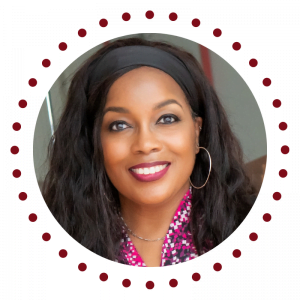
Want Karan to be Your Podcast Guest?
- Blended Workforces & the Gig Economy
- Critical Execution Tactics of High-performing Leaders
- Entrepreneurism & Leading Your Business

Want to be a Podcast Sponsor?
All sponsorships come with a featured spot on show notes pages.
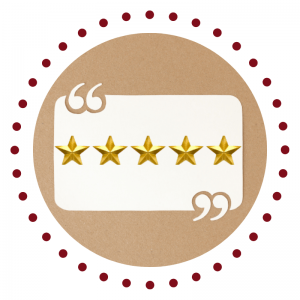
Like the Show? Please Leave a Review
If you like the show, it would mean the world to her if you left a quick review.
Your word is golden, so a HUGE thank you in advance!

#KeepInTouch
via our podcast alerts
Subscribe now to discover why thousands of monthly listeners who are passionate about doing their best work prioritize time each week to listen to the Blended Workforces @Work podcast.
#AboutSDL
#WhereToFindUs
MAILING
4480-H South Cobb Drive
PMB 219
Smyrna, GA 30080
PHYSICAL
2121 NewMarket Parkway
Ste. 108
Marietta, GA 30067
#ContactOptions
Customer Service Email:
service@shockinglydifferent.com
Call or Text:
770-384-1103
#Office Hours
MON-FRI
8:30 AM – 6:30 PM
Weekends By Appointment

